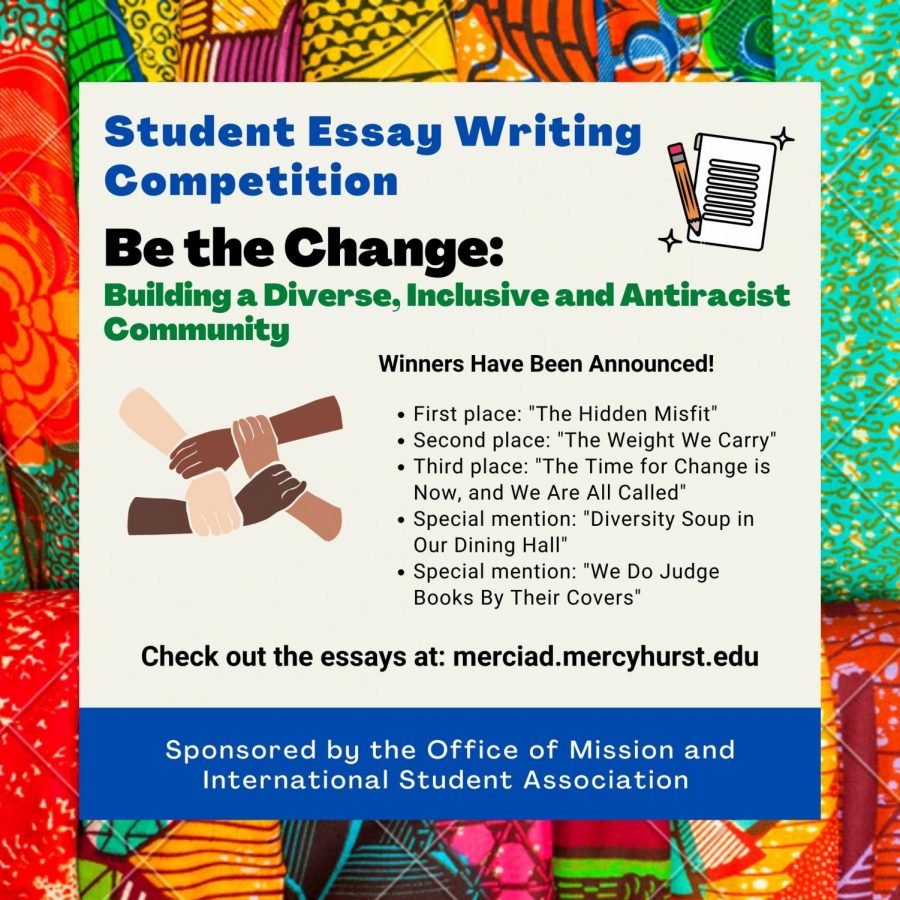Be the Change: “The Hidden Misfit”
April 13, 2021
This is the winning essay from the “Be the Change: Creating a Diverse, Inclusive and Antiracist Community” Essay Contest. This story is being published anonymously on the Merciad website. The second and third place entries will be published in the coming weeks.
The Hidden Misfit
Have you ever felt truly different? I have felt that way my entire life. As a child, I always felt different to my peers, and as a teenager, I realized my sexuality was the cause. However, this was something I was always able to hide. Even if I felt different, I could project perfect ease on the outside. I am what people call ‘straight passing.’ I don’t “look,” “sound” or appear to be gay, even if I am. It is rare for anyone to ever assume my sexuality based on my appearance or the way I talk. This privilege has been confusing and comforting depending on the situation.
However, having this privilege as a queer white woman has made me think a lot about race. I have a choice in whether or not I present my sexuality to the world, but we never have a choice about showing our skin. Race is like an inescapable story that we are forced to share with the world, and racism brings unavoidable violence to each chapter of the plot.
Race is a social construct tied so deeply to perception and privilege that we as a community are struggling to ever shake off the shackles of its social implications. At Mercyhurst, we have a unique opportunity to erase systemic and micro acts of racism in our campus community, with the right and purposeful steps. Because people cannot hide from racism, it is up to white people to never hide from hearing and challenging its effects. Although the Hurst is entrenched in merciful and antiracist ideals, we have a long way to go as an institution. Race has permeated every facet of our society, and even as an educated and antiracist person, I know I have not been left unscathed by the systems which sow bias in us from a very young age.
Although I felt different growing up, I don’t think I ever felt “white.” It wasn’t something I needed to identify about myself because the culture I grew up in was so homogenous. I remember seeing people of color for the first time because I was old enough when I saw people who looked so different to me that I still consciously have those memories. My community wasn’t diverse, so diversity was something my family and I had to seek out. This often makes me sad, but also gives me hope that hate is never innate, and that enjoyment of inclusivity is naturally learned. I have spent so much time feeling different inside that being queer has made me think a lot about what I am doing to make others in the room feel that they fit in, even on the outside. For me, this has to start with the one thing we cannot hide, and that is race.
If diversity is the first step, then the key for our Mercyhurst community is recruitment. We need to be actively enrolling students of color. We cannot hope that these students come to us – we have to go them. This takes effort and resources. However, recruitment is not enough. When students come here, they have to feel included. Belonging is our most natural human need. Members of marginalized communities are looking for these spaces where they feel seen and listened to. This means we must project to them how welcome they are, through what they hear, they see, and they feel as soon as they step through the gates.
Being frank about Mercyhurst now, we are not projecting a safe haven for our brothers and sisters of color. We are not sharing stories of their successes, nor posting pictures of them for our prospective students, nor emphasizing the role they have played at Mercyhurst. Our traditions, our leaders, and even our mascot have been based on white culture. This is not conscious racism, but it is the legacy of the hierarchy of white power which has run this country, stemming from who runs the school right down to who runs the social media accounts.
We also need to get people talking about race in informalized and meaningful ways. Professors need to bring diversity into the classroom in engaging and informal ways. When students share experiences, they need to listen. Most of all, when a student feels unwelcome or marginalized, we never have the right to tell them they do not.
Lastly, when in doubt, revert to the core values of the Sisters of Mercy. The Sisters call us to be active in our pursuit of justice and our stance on neighborly love. To become totally diverse, inclusive and antiracist, Mercyhurst must remembers its roots. Lakers should be:
Liberal in giving their time and energy
Accessible to those who want to speak
Kindred spirits for those who have suffered
Energized to end racist systems
Renewed by the values of inclusivity and service
Steadfast in being antiracist Ambassadors, inside and beyond the gates
The sooner we bring these elements of the mission and vision of Mercyhurst together, we will have created a community which rivals most. Creating true diversity and antiracism is a difficult feat, but what has been built by humans can be disestablished by them. Dismantling racism therefore begins within. Being the change is being a true Laker.

